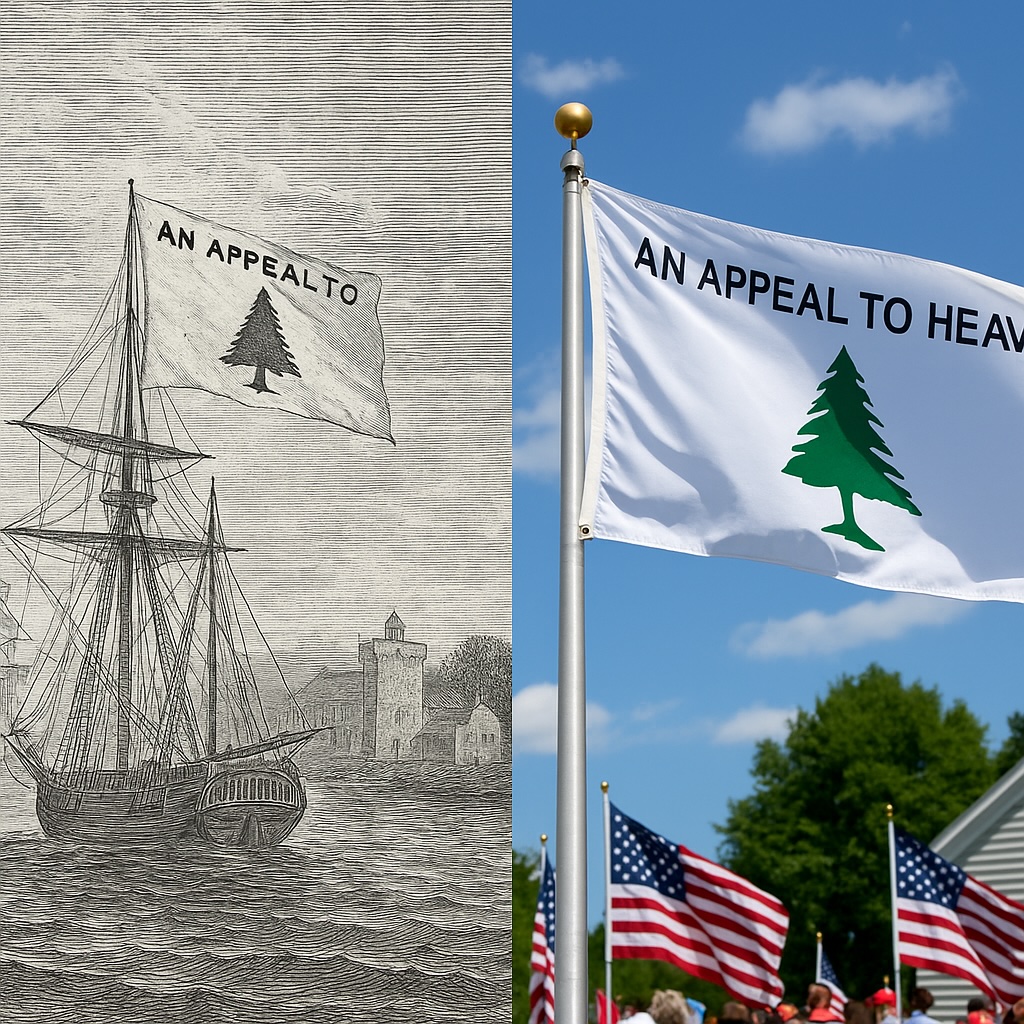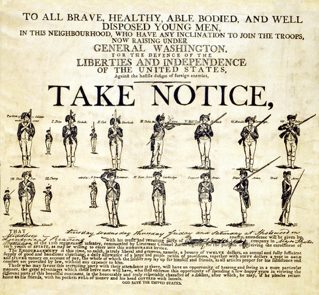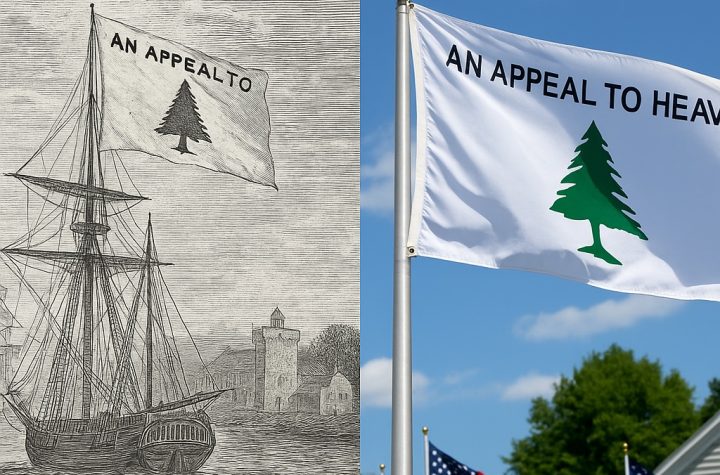
In July 2025, a historic Revolutionary War flag unexpectedly found itself at the center of a modern political controversy. The flag – a white banner emblazoned with a green pine tree and the words “AN APPEAL TO HEAVEN” – was raised at a U.S. federal agency and promptly criticized by a senator as a symbol of extremism. This clash has drawn national attention to the banner’s true origin and meaning. In this post, we’ll explore what the “Appeal to Heaven” flag is, its rich history dating back to General George Washington’s era, and why it remains significant. We’ll also let you know where you can get your own Appeal to Heaven flag for sale, to proudly display this piece of American heritage.

A group of Americans display the “Appeal to Heaven” flag (also known as the Pine Tree Flag) alongside U.S. flags at a public rally. This Revolutionary War-era flag has recently sparked debate after its appearance at a federal agency.
An Appeal to Heaven flag for sale
From Flag Day to Fox News: A Historic Banner Sparks Controversy
On Flag Day 2025, the U.S. Small Business Administration (SBA) raised an “Appeal to Heaven” flag beneath the Stars and Stripes at its Washington, D.C. headquarters as part of a ceremony. The flag’s presence quickly became controversial when Senator Ed Markey (D-MA) publicly condemned it, calling the historic banner a “Christian nationalist, White supremacist” symbol that was “inappropriate at a federal government institution”. Markey argued in an open letter that federal agencies should remain above partisan or extremist icons, saying such symbols “undermine democracy and promote division”. His criticism was rooted in recent associations of the flag with certain far-right groups – some media outlets noted the pine tree flag had been carried by Jan. 6 rioters and linked to “Christian Nationalist” and election-denier movements in the 2020s.
The SBA’s Administrator, Kelly Loeffler (a Trump-appointed official), fired back in defense of the flag. In a sharply worded response, Loeffler reminded the senator of the flag’s Revolutionary War pedigree and even highlighted potential double standards. She noted that flag symbolism can be subjective, pointing out the irony that Massachusetts’s own state flag has been labeled a “racist” emblem by some (due to its depiction of a Native American and colonial sword). Loeffler rejected Markey’s characterization of the Appeal to Heaven flag, emphasizing its patriotic legacy. “I do not agree with your characterization of the Appeal to Heaven flag – which has a rich history as an appeal to God to protect our emerging nation’s liberty dating back to its first usage by General George Washington in the Revolutionary War,”she wrote, calling it “one of our earliest emblems of freedom and independence” that represents principles the SBA supports. In other words, what some critics dismiss as an extremist banner, supporters see as a timeless symbol of faith, liberty, and America’s founding values.
Origins of the “Appeal to Heaven” Flag – A Revolutionary War Icon
To understand the significance of this flag, it’s worth looking back to its birth during the American Revolution. Also known as the Washington’s Cruisers Flag or simply the Pine Tree Flag, the Appeal to Heaven banner has deep roots in the colonies’ fight for independence. Here are some key facts and origins of the flag:
- First Flown in 1775: General George Washington commissioned a small fleet of six schooners in October 1775 to harass British supply lines. To identify his ships at sea, Washington’s secretary Colonel Joseph Reed suggested a distinctive flag design – a white field charged with a green pine tree and the motto “AN APPEAL TO HEAVEN”. This “Appeal to Heaven” flag was soon flying on Washington’s ships (dubbed Washington’s Cruisers) as one of the first flags of the fledgling American navy.
- Motto Meaning – Appeal to Divine Justice: The phrase “An Appeal to Heaven” was not a random slogan; it comes from the writings of John Locke. In Locke’s Second Treatise on Government, he used “appeal to Heaven” to describe the right of revolution – essentially, when all legal avenues are exhausted, one can appeal to a higher power (Providence) for justice. For the American colonists, the motto signified that, having failed to obtain justice from the British Crown, they were entrusting their cause to God’s judgment. The flag’s words “An Appeal to Heaven” thus embodied the colonists’ hope that God would deliver them from tyranny.
- Pine Tree Symbolism – New England’s Liberty: The pine tree at the center of the flag was a familiar emblem in New England, with its own revolutionary significance. Tall white pines were prized for ship masts, and British attempts to reserve these trees for the Royal Navy sparked colonial resentment (even leading to the Pine Tree Riotof 1772, an early act of rebellion in New Hampshire). Thus, the green pine tree on the flag represented the colonies’ natural resources and their defiance against British exploitation. It had appeared on earlier colonial flags and coins, and on this flag it proclaimed New England’s unwavering spirit of independence.
- Adopted by Massachusetts Navy: Fittingly, the Massachusetts Provincial Council in April 1776 officially adopted the pine tree flag (with the “Appeal to Heaven” motto) as the ensign for the Massachusetts State Navy. Many Massachusetts naval vessels and privateer ships sailed under this banner during the Revolutionary War. In fact, the legacy lives on – to this day, a version of the pine tree flag (without the motto) remains the official maritime flag of Massachusetts. In other words, the flag is not some fringe artifact; it was a widely recognized standard of liberty in the American Revolution and an official symbol of a founding state.
The design of the “An Appeal to Heaven” flag: a lone evergreen pine tree on a field of white, with the bold motto overhead. First commissioned by George Washington in 1775 for the Navy, this flag’s imagery conveyed the colonies’ reliance on divine providence and the natural strength of New England.
The Appeal to Heaven flag quickly became one of the most important flags of the 1775–1776 period, especially in the Northeast. It flew during key moments of the Revolution – for example, some reports suggest colonial troops at the Battle of Bunker Hill carried a pine tree flag with a similar motto, and the design was later featured in Revolutionary War paintings and even a 1968 US postage stamp series of historic flags. As the Stars and Stripes eventually took center stage in 1777, the Appeal to Heaven flag’s official military use waned, but its legacy as an early emblem of American independence was cemented.
Modern Resonance: Faith, Patriotism, and Debate Over the Flag
Fast forward to today, and the Appeal to Heaven flag has never truly vanished – in fact, it has seen a resurgence in various circles. Many Americans who are passionate about the nation’s founding principles have embraced the flag as a symbol of faith-based patriotism. Its message of trust in divine Providence and freedom from tyranny resonates with those who see the United States as having a special purpose or blessing. The flag is still displayed in historical sites (for example, it hangs in Boston’s Faneuil Hall and at some colonial reenactments) and remains the banner of Massachusetts naval units, as noted earlier. For these supporters, flying the pine tree flag is a way to honor the Revolutionary generation’s courage and to invoke the same spirit of liberty under God in today’s America.
However, the flag’s increased visibility has also led to controversial modern associations. In recent years, some fringe and extremist groups have adopted the Appeal to Heaven flag for their own rallies and causes. Notably, the flag was spotted at the January 6, 2021 “Stop the Steal” rally in Washington, D.C., and has been waved by certain far-right Christian nationalist groups. This co-opting by modern political movements (unrelated to its original context) is exactly what prompted Senator Markey and others to claim the flag has taken on a partisan, even “white supremacist,” meaning. Critics argue that the slogan “appeal to Heaven” is used by some theocratic or militant groups to signal that they answer to a higher power than civil government – hence, they view the flag as a Christian nationalist banner in those settings.
Supporters counter that this interpretation is misguided. They point out that a historic flag cannot be judged solely by the actions of a few modern groups who use it. The original intent of the flag was universal and heroic – it stood for unity, divine guidance, and freedom in the American Revolution. Just as Justice Samuel Alito noted, “The use of a historic flag by a new group does not ‘drain’ the flag of other meanings.” In fact, Justice Alito’s family made headlines in 2023 for flying the Appeal to Heaven flag at their home, which sparked debate; Alito explained that he understood it as a “religious and patriotic” message and was “not aware of any connection” between the historic flag and the modern Stop the Steal movement. His stance underscores a key point: a symbol with such deep roots in American history carries multiple layers of meaning. While extremists might wave it today, that does not erase its genuine patriotic heritage.
Kelly Loeffler echoed this sentiment in her response to Sen. Markey. She stressed that the Appeal to Heaven flag’s “historical connotation” as an emblem of America’s first fight for liberty still holds true. In her view (and that of many Americans), the flag represents principles like freedom, faith, and resistance to oppression, which are far from “hateful” or extremist. Indeed, it’s telling that Massachusetts – the state Markey represents – officially honors the Pine Tree flag in its naval ensign to this day. The context in which the flag is displayed clearly matters. A government agency flying it on Flag Day to commemorate Revolutionary War history is a far cry from rioters misusing it at a protest. Understanding the flag’s true story can help separate the timeless patriotism it embodies from the temporary headlines it finds itself in.
An Appeal to Heaven Flag for Sale – Own a Piece of History
For history enthusiasts and patriots who want to celebrate this iconic flag rather than see it maligned, owning an Appeal to Heaven flag is a meaningful way to connect with America’s heritage. Here at US Patriot Flags, we’re proud to offer high-quality versions of the Washington’s Cruisers flag – so you can display the same banner that flew on George Washington’s ships and inspired early Americans. Our Appeal to Heaven flags are Made in the USA and come in multiple sizes and configurations to suit your needs. Whether you’re looking to decorate your home, fly it on a flagpole, or use it for educational events, you’ll find the perfect option in our catalog.
Some features and options available include:
- Durable Flags in Various Sizes: Choose from a range of flag sizes (small 3x5ft up to larger flags) all crafted with quality materials. We even offer double-sided prints or sleeve attachments on request for an extra bold display. Every flag is built to withstand outdoor use while looking great indoors, too.
- Pine Tree Flag Themed Gear: In addition to traditional flags, US Patriot Flags also offers related items like flag patches, hats, bumper stickers, and license plates featuring the Appeal to Heaven design. These are excellent for showing your patriotic spirit in different ways or gifting to a fellow history buff.
- Authentic and Customizable: Our flags closely follow the historical design – a white field, green pine tree, and bold black lettering – so you get an authentic replica of the 1775 original. If you have specific requirements (such as a custom size or special wording), we can custom-make a flag to your specifications. We take pride in American craftsmanship and ensure each flag meets high standards of color and durability.
When you fly the Appeal to Heaven flag, you are not only making a statement; you are also honoring the legacy of the Revolutionary War generation. It’s a fantastic conversation starter about America’s early fight for freedom and the beliefs that united the colonists. Owning this flag is a reminder of the timeless principle that when injustice prevails, one can appeal to a higher law for justice – a concept that fueled our nation’s founding spirit.
In conclusion, the recent uproar surrounding the Appeal to Heaven flag has, in many ways, brought this historic banner back into the spotlight. While modern politics can cloud the picture, the fact remains that this flag tells a uniquely American story – one of resilience, faith, and the quest for liberty against the odds. Rather than allowing a patriotic symbol to be lost or mischaracterized, we can appreciate its true meaning and display it with pride. As the founders believed, an appeal to Heaven signifies hope when all else seems impossible. That hope, stitched into a flag over two centuries ago, continues to inspire Americans today.
Whether you’re a history lover, a person of faith, or simply someone who values the ideals of 1776, the Appeal to Heaven flag is a powerful emblem to cherish. And if you wish to make it your own, you know where to find it – US Patriot Flags is here to help you keep the spirit of 1775 alive, right at your home or business. Fly it high, and let its story speak for itself.
Sources:
- Fox News – “Trump official fires back at Democratic senator who called historic flag ‘Christian nationalist’ symbol.” (July 1, 2025)
- Fox News – Article description of the Appeal to Heaven flag’s history and controversy
- Pine Tree Flag (Appeal to Heaven Flag) – Wikipedia (Historical background and usage during the Revolution)
- Liberty Flags Blog – “A Brief History of the Washington Cruisers Flag” (February 5, 2025) – historical details on design and symbolism
- Kansas Reflector – “This is not a garden flag: the treachery of Alito’s vexing icons” (June 2, 2024) – discussion of modern use and Justice Alito’s comments
- US Patriot Flags – Product Page for Appeal to Heaven (Washington Cruisers) Flag – details on flag products and description
Where can I purchase an authentic “Appeal to Heaven” flag to display patriotism or for educational purposes?
You can buy authentic “Appeal to Heaven” flags from US Patriot Flags, which offers high-quality versions made in the USA, in various sizes and configurations. These flags are designed to honor American heritage and serve as a meaningful symbol of faith, liberty, and history.
What are the origins of the “Appeal to Heaven” flag during the Revolutionary War?
The flag was commissioned by George Washington in 1775 to identify his fleet of ships. Its design featured a white field with a green pine tree and the motto “An Appeal to Heaven,” representing divine justice, natural resources, and the colonies’ fight for independence, notably adopted by Massachusetts Navy.
How do supporters defend the historical and patriotic value of the “Appeal to Heaven” flag?
Supporters emphasize that the flag’s original use was as a symbol of faith, liberty, and resistance to oppression during the American Revolution. They argue that modern misuse does not diminish its foundational meaning, which is rooted in unity and divine guidance.
Why did the “Appeal to Heaven” flag become controversial in recent years?
The flag has become controversial because some fringe groups and extremists have adopted it for rallies and causes unrelated to its original meaning, leading critics to associate it with extremism, Christian nationalism, and white supremacy, especially after its appearance at events like the January 6 rally.
What is the significance of the “Appeal to Heaven” flag in American history?
The “Appeal to Heaven” flag was first flown in 1775 during the American Revolution and served as a symbol of the colonies’ reliance on divine providence and their fight for independence. It embodied the colonies’ hope that God’s justice would aid their cause against tyranny.




More Stories
The Road to Victory: Trump’s Historic 2024 Election and the Patriotic Flag Surge
Honoring Heroes of the Maui Wildfires
A Military Coup Threatened